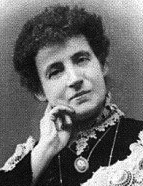

Europe had to wait until 1904, when Carolina was 53, for the publication of the colossal ensuing work, which was representative of her incessant activity as a critic, diplomat, linguist and historian of literature and language who also left us her contribution to toponymy, genealogy and the biography of historical figures (Cancioneiro da Ajuda…, 2 vols., 1904). It would, however, be hard to see Carolina as a historian in the strict sense of the term, which is why she wrote no monographs in this respect. Her choice of subject matters is a fundamental reflection of the way in which she looked at things with the eye of a social scientist, and is in its own right enough to allow us to say that her secular, rationalist historiographical narrative falls within the framework of a liberal tradition made more sophisticated by idealism. The idea of ‘nation’ that was constantly present in her thinking was not linked to kings or dynasties, or even to an idea of will or reason – she saw the nation as something that became an essence and manifested itself in the people, via the language. The way in which she evaluated people, actions and movements, be they historical or of her own day, was based on her position with regard to knowledge – scientific knowledge, scholarship, reflection, interest, always modulated by a cultural and religious tolerance. In this respect her life and her work went hand in hand.
Carolina’s “Lusism” was idealistic, but she proved progressive and pragmatic in her relationship with the Portuguese language and the way it was used in public life – since 1903, she had argued in favour of the simplification proposed by Gonçalves Viana, which she immediately adopted, and she took part in the committee that prepared the 1911 orthographic reform. Her feminism was also set within the framework of a politically conservative progressivism, in which her learning and propriety, motherhood and family life placed her apart from the more inflamed wing of the movement (suffragism, socialism and free love). Her idea of history was not theorised; rather it was derived from intense work over years of study, in direct touch with documents and archives. Carolina employed this empiricism in conjunction with a way of working she brought from Germany, which was derived from her studies of philology and possessed a major historical dimension that involved critiquing documents based on a careful palaeographic transcription and the science of studying formal documents. Rationalism, and in particular positivism, may perhaps provide us with the first nexus here. She thought that rigorous method made it possible to uncover the truth, whose outlines had to be completely revealed – a scientific truth, which could be criticised and updated by a community of experts.
In Portugal her companions in this struggle were Teófilo Braga, who was the main proponent of linguistic positivism, and Adolfo Coelho. Carolina was closer to the latter and to Fidelino Figueiredo, in his role as the methodical and rigorous author and disseminator of A crítica literária como ciência (Literary criticism as a science, 1912).
